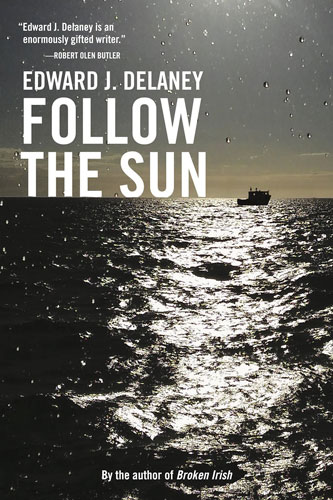Follow the Sun
Quinn Boyle, a deep-sea fisherman, and his older brother Robbie, a sports journalist, lead an impressive cast of characters looking for answers to some mysterious disappearances in Edward J. Delaney’s book Follow the Sun.
Quinn Boyle, a deep-sea fisherman, and his older brother Robbie, a sports journalist, lead an impressive cast of characters looking for answers to some mysterious disappearances in Edward J. Delaney’s book Follow the Sun.
Quinn’s been fishing for lobster and other catches for twenty-five years. Along the way, he’s developed a drug habit, no thanks to a fellow crew member called Santoro, “who’d fed him those bags of heroin in endless, easy procession.” Eventually the law catches up to Quinn, who pleads guilty to possession, serves time in prison, then disappears. Coincidentally or not, Santoro also can’t be found.
Both Quinn and Robbie have families, including ex-wives, girlfriends and daughters, that naturally become involved, which leads to a second mystery: Is Quinn really the father of Christine? The novel relies on a flurry of backstories throughout, one showing the relationship between Quinn’s ex-wife Gina and her daughter. Here’s a glimpse:
[Christine] was too young to wonder about the men who were on the couch when her father was at sea, the men who sat with their feet on the coffee table drinking their beer as she was taken by her mother’s hand and put in bed.
Meanwhile, Robbie has his hands full dealing with his former girlfriend, Dawn, and his current one, Jean. Add to that the irate dad who continually harasses Robbie about how the child’s athletic skills are portrayed in Robbie’s sports column.
But Robbie faces his major challenge after hearing rumors of Quinn and Santoro sightings, compounded by a chance encounter at a bar that compels him to pursue the truth about his brother.
The original story, of two lobstermen going down in a failing boat, had always been too easy, because it was such an obvious outcome. But the complications of what had really happened now had a multitude of disturbing dimensions, none of them favoring Quinn or his survival. [ . . . ] [I]t was one thing to imagine an accident far at sea, and different to imagine something not accidental at all.
At this point, the narrative really comes to life.
Some of the finest moments in Follow the Sun exist when Delaney writes about life aboard fishing vessels. Here’s how the men deal with a particularly tricky catch: “banding a lobster’s claws, you don’t hold it upside down, which makes the lobster nervous; nervous lobsters drop claws, and a one-claw lobster is a cull, and a cull is wasted money.”
We can also visualize Quinn on the conveyor line of another ship as it “begins to ingest fish, a ravenous factory lumbering over high seas, where [the fishermen] likewise become machines.”
Accidents are no stranger to life at sea. When one of Quinn’s men apparently washes overboard, Quinn explains to the man’s widow that all the crew had life vests per regulations:
but the regulations didn’t say you had to be wearing one. That it was easy to get too blasé walking along the open stern as the trawl let out with the big polyball floats and the ground lines and ganglion whooshing wetly by your ankles. [ . . . ] That people misstep, all the time, but it’s worse with forty liquid fathoms beneath you.
Delaney also excels in interpreting Quinn’s thoughts and feelings during his time in prison:
Prison became the slow killing of days, the choking of days, and the hatred of their breadth, and the impatient wait to sleep. [ . . . ] [H]e understood why the lure of the handmade noose or other terminally clever ways of beating the system became seductive, even in this lightweight prison. [ . . . ] But the odd thing was morning. [ . . . ] The cool hand of the air just at dawn, when the small slot of window allowed a shaft of sun to crawl across his wall, [ . . . ]. Mornings made him want to live, with those gold sunrises whispering to him to just hang on.
I wondered at times if Delaney was borrowing and rephrasing real-life episodes into the novel, particularly when it came to passages that illustrated interactions among the parents and children in our protagonists’ families. Then there’s the fact that all the people in Follow the Sun have names, with the exception of Robbie’s first wife. She gets only an initial: M. I can’t help but wonder why this woman didn’t deserve a name.
My quibbles are minor, and they don’t interfere with the enjoyment of reading about a man’s mission to find the truth about his brother. Delaney wraps up Follow the Sun with a dramatic and action-filled climax that’s certainly worth waiting for.





